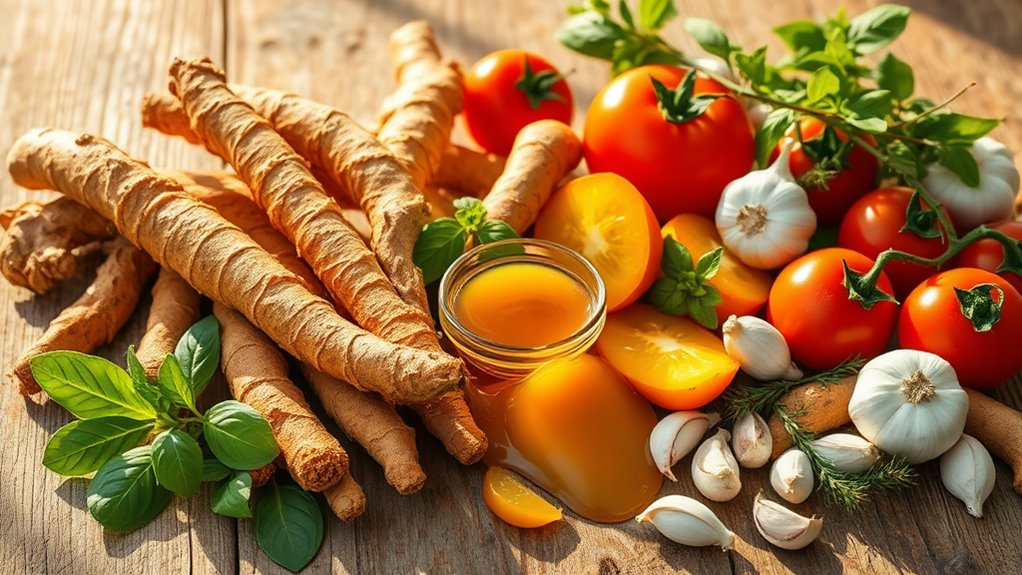Traditional Healing Foods That Are Still Essential Today
You might be surprised to learn that many traditional healing foods still play a crucial role in modern health. Ingredients like honey, garlic, and turmeric have stood the test of time, offering benefits backed by science. These foods not only help fight infections and reduce inflammation but also support gut health and immune function. Curious about how these simple ingredients can enhance your wellness? Let’s explore the remarkable properties they bring to your diet.
Honey: Nature’s Antiseptic and Energy Booster
Honey, often referred to as nature’s liquid gold, has been celebrated for centuries not just for its sweetness, but also for its remarkable health benefits.
As a natural antiseptic, honey can effectively combat infections and promote wound healing.
Its antibacterial properties stem from hydrogen peroxide and other compounds, making it a staple in traditional healing foods.
Moreover, honey’s natural sugars provide a quick energy boost, perfect for athletes or anyone needing a lift.
Incorporating honey into your diet not only enhances flavor but also supports overall wellness, bridging ancient practices with modern nutrition for a holistic approach to health. Additionally, its antioxidant properties help protect the body from oxidative stress and inflammation.
Turmeric: the Golden Spice With Powerful Anti-Inflammatory Properties
Incorporating natural remedies into your diet can enhance your health in various ways, and turmeric stands out as a potent ally in this journey. This golden spice contains curcumin, a compound known for its powerful anti-inflammatory properties.
Studies show that curcumin can help reduce symptoms of arthritis, support heart health, and even improve cognitive function. By adding turmeric to your meals or smoothies, you’re not just adding flavor; you’re also harnessing its healing potential. Additionally, turmeric is often paired with black pepper to enhance the absorption of curcumin, maximizing its health benefits.
With its rich history in traditional medicine, turmeric remains a vital ingredient for promoting overall wellness and managing inflammation effectively in today’s world.
Garlic: a Natural Antibiotic With Immune-Boosting Benefits
Have you ever considered how garlic can serve as a powerful natural antibiotic?
This humble bulb not only adds flavor to your meals but also boosts your immune system.
Garlic contains allicin, which has antimicrobial properties that combat bacteria and viruses.
Incorporating garlic into your diet can help you ward off common colds and infections.
- Enhances immune response
- Reduces inflammation
- Supports heart health
To reap the benefits, try consuming raw garlic or adding it to your favorite dishes. Additionally, immune-boosting superfoods like garlic can significantly enhance your overall health and resilience against illnesses.
Ginger: A Digestive Aid and Anti-Nausea Remedy
Ginger’s powerful properties make it a go-to for improving digestion and alleviating nausea. You can easily incorporate it into your meals or enjoy it in soothing teas, tapping into traditional remedies that have stood the test of time. Let’s explore the health benefits, culinary uses, and practices that highlight ginger’s role in holistic wellness. Additionally, ginger is often included in herbal teas for its natural ability to relieve bloating and support digestive health.
Health Benefits of Ginger
Ginger offers a wealth of health benefits, particularly as a digestive aid and anti-nausea remedy.
When you incorporate ginger into your routine, you may experience significant relief from various ailments.
- It can soothe an upset stomach and promote digestion.
- Ginger’s natural compounds help reduce nausea, especially during pregnancy or motion sickness.
- Its anti-inflammatory properties may aid in reducing bloating and gas.
Culinary Uses and Recipes
Incorporating ginger into your meals not only enhances flavor but also provides significant digestive benefits.
You can easily add fresh ginger to stir-fries, soups, or marinades for a zesty kick.
Try grating it into your morning smoothie or steeping slices in hot water for a soothing tea.
Ginger pairs well with garlic and scallions, making it perfect for savory dishes.
For a sweet treat, bake ginger into cookies or muffins.
You’ll find that using ginger not only aids digestion but also elevates your culinary creations, making them both delicious and healthful at the same time.
Traditional Remedies and Practices
One potent remedy for digestive discomfort and nausea is ginger, a time-honored ingredient in traditional healing practices.
You can easily incorporate ginger into your daily routine to relieve symptoms effectively.
Research shows it helps reduce nausea from motion sickness and morning sickness.
- Brew fresh ginger tea for soothing relief.
- Add grated ginger to your meals for flavor and health benefits.
- Chew on ginger candies for a quick anti-nausea fix.
Embracing ginger not only enhances your dishes but also supports your digestive health holistically, making it an essential addition to your wellness toolkit.
Bone Broth: A Nutrient-Dense Elixir for Gut Health
Bone broth, often hailed as a culinary treasure, packs a powerful punch for your gut health.
Rich in collagen, gelatin, and amino acids, it supports your digestive system by soothing the gut lining and promoting a balanced microbiome.
Studies suggest that the glycosamine in bone broth can help reduce inflammation and improve gut permeability, making it easier for nutrients to be absorbed.
Incorporating this nutrient-dense elixir into your diet can enhance overall wellness, boost immunity, and aid digestion.
Whether sipped on its own or used as a base for soups, bone broth is a simple yet effective way to nurture your gut. Additionally, natural foods like bone broth are essential in promoting gut healing and overall digestive health.
Fermented Foods: Probiotics for a Healthy Microbiome
Fermented foods are packed with probiotics that can significantly boost your gut health and overall well-being.
By incorporating options like yogurt, kimchi, and sauerkraut into your diet, you can enhance your microbiome and improve digestion.
Understanding the benefits and types of these foods will help you make informed choices for a healthier lifestyle.
Benefits of Probiotics
How can incorporating probiotics into your diet transform your gut health?
Probiotics, found in fermented foods, can enhance your microbiome and overall well-being.
These beneficial bacteria support digestion, boost immunity, and even improve mood.
By prioritizing probiotics, you can cultivate a balanced gut environment.
- Strengthen your immune system by promoting healthy gut flora.
- Enhance digestion and nutrient absorption for better overall health.
- Support mental well-being through the gut-brain connection.
Embracing probiotics not only aids digestion but also fosters a holistic approach to health, making them essential for a vibrant lifestyle.
Types of Fermented Foods
A diverse array of fermented foods can significantly enhance your gut health by introducing beneficial probiotics into your diet.
Yogurt, rich in live cultures, supports digestion and boosts immunity. Sauerkraut and kimchi, packed with vitamins and fiber, promote a healthy microbiome. Kombucha, a fermented tea, offers antioxidants while aiding detoxification. Miso and tempeh, fermented soybean products, provide plant-based protein and essential nutrients. Kefir, a fermented milk drink, contains even more diverse strains of probiotics.
Incorporating these foods into your meals can foster a balanced gut environment, improve digestion, and support overall health. Embrace these traditional foods for lasting wellness benefits.
Incorporating Fermented Foods
Integrating fermented foods into your daily diet can transform your gut health and overall well-being.
These foods are rich in probiotics, which support a healthy microbiome and enhance digestion.
To get started, consider these simple additions:
- Kefir: A creamy, tangy drink loaded with beneficial bacteria.
- Kimchi: A spicy, fermented vegetable dish that adds flavor and nutrition.
- Sauerkraut: Fermented cabbage packed with vitamins and gut-friendly probiotics.





